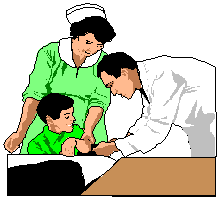 |
ST. AUGUSTINE UNIVERSITY
OF TANZANIA
Health
Administration
A One-Year
Certificate
Programme

St.
Augustine University of Tanzania
P.O.
Box 307, Mwanza, Tanzania
General Course Objectives
The one-year course in Health Administration is
intended to provide students with sufficient knowledge and expertise to
administer Health Centres, as well as small to medium-sized Hospitals and other
Health Care programmes.
Minimum Entry Qualifications
Candidates must have:
either
a Form VI Advanced Secondary Education Certificate (A-level), with at
least two principal passes in Mathematics and English;
or
a Form IV
Ordinary Secondary Education Certificate (O-level), with passes in Mathematics
and English,,together with work experience of at least two years, preferably in a
health care organisation.
Course Content
HA 100 Health
Administration
Aim: To enable students to gain
the knowledge needed for administration of health and health-related
organisations.
Contents:
Introduction to health administration.
Organisational design. The medical superintendent. General management.
Personnel management. Labour relations. National Health Policy.
Public relations. Medical records. Health statistics.
HA 101 Health
Systems
Aim: To enable students to learn
various approaches to systems of health care and understand how they may affect
overall planning and decision-making in the day-to-day administration of health
care services.
Contents:
Introduction to health systems: definitions,
indicators of health status of a society; national health systems: a model,
determinants, Health Information Systems.
HA 102 Health
Law
Aim: To enable students to
understand the general principles of law and how they relate to health
administration.
Contents:
General introduction to laws. Nuisance. Consent for operation and
treatment. Professional competence and cognate matters. Vital registrations. Law
of bailment. Law of master and servant as affecting hospital staff. Medical
records. Pharmaceutical and poisons act.
HA 103 Health
Economics
Aim: To enable students to gain
an introductory knowledge of basic economic theories, economic analysis and
economic reasoning, and develop basic skills in effective use of health
resources.
Contents:
Introduction. Major concern of economists in health care. Demand and
supply for health services. Health
services and the market. Operating cost in relation to health care provision.
Planning for health care services. Demographic
studies. Alternative methods of
financing health care services. Current
issues in health care.
AC 100 Book
Keeping and Elements of Auditing
Aims: To enable students to learn the basic
theories and gain a practical knowledge of book keeping and accounting, and to
understand the elements of auditing, so they will know various audit procedures
and tests used to ascertain and record accounting systems and internal control
systems.
Contents:
Fundamentals of book keeping. Accounting theories. Classification of
expenditure and income. The journal and its use. Preparation of trial balance,
trading and profit and loss accounts, detailed balance sheet.
Making adjustments. Use of
cash-book, ledger imprest system and petty cash book. Incomplete records.
Non-trading institutions.
Banking
transactions. State cheques and their accounting treatment.
Financial statements. preparation of receipts and payment accounts,
income and expenditure accounts, balance sheets of non-profit organisations.
Incomplete records. Interpretation of financial statements.
Elements of auditing.
AC 103 Elements
of Costing and Materials Management
Aims:
To enable students to gain an elementary
knowledge of costing, and to become familiar with the fundamentals of
purchasing, supply and storekeeping of materials.
Contents:
Elements
of costing. Cost accounting: concepts and objectives.
Classification of costs, cost statements, costing for materials, labour,
overheads.
Materials
management. Purchasing: practice and techniques, international purchasing,
store-keeping or store function.
QM 101 Commercial
Arithmetic
Aim: To enable students to
develop basic skills in the collection, processing, presentation and
interpretation of simple numeric and statistical data in their separate
applications to business situations.
Contents:
Elements of mathematics: Basic
arithmetic processes. Trading. Methods of payment and banking. Business
ownership. Investments.
Elements of statistics: Meaning
of statistics. Data collection methods. Classification and presentation of data.
Measures of central tendency. Simple index numbers.
PHL 201 Social
Ethics
Aims: To enable students to acquire a set of
principles of moral behaviour that are of universal application and are required
in our everyday decisions and activity.
ontents:
Definition of ethics, social ethics, moral philosophy.
Nature of man. Search for
moral standards. Moral obligation and Natural Law.
Rights and duties. Business ethics. International ethics.
Practical Training
All students in the Certificate in Health
Administration course are required to spend the months of June, July and August
at the end of their course doing practicals in District hospitals, voluntary
agency hospitals and health programmes, after which they will have to write and
submit a Fieldwork Report, which is evaluated.
An evaluation report of work performance is usually required from the
heads/supervisors of those institutions. Students
are also encouraged to submit their own assessment of their experience.
Fees
Fees for tuition, room and board for 2000-2001 are
Tshs 860,000. For students from
outside Tanzania, $5,000.
Special Course Requirements
All students pursuing a Certificate course in Health
Administration are required to have a scientific calculator and mathematical
table booklets. In addition,
Certificate students will need the following. (Note: approximately Tshs. 790 =
US$ 1.00.)
Book allowance. Suggested:
Tshs. 90,000.
Stationery allowance. Suggested:
Tshs. 75,000.
Medical allowance. Suggested:
Tshs 75,000
(for
costs beyond scope of on-campus
dispensary).
An allowance to cover three months of field work.
Recommended: Tshs. 7,000 per day.
Appropriate funds for spending money and necessary
travel.
Note for Foreign Students
Since convertible foreign currency is required
of all foreign students, the following allowances are stated in US dollars:
Personal allowance:
A minimum of $25 per month is recommended.
Books, Stationery, Medical allowance:
A total of $400 is recommended.
The Residence Permit required for foreign students
costs $120.
To Apply
For further information and an application form,
please contact:
St. Augustine
University of Tanzania
P.O. Box 307
Mwanza,
Tanzania
Fax:
255-028-2550167, 2500575
e-mail:
saut@maf.org
Telex: 46372
Website:
http://saut.ac.tz.tripod.com
Note: Applications, academic certificates, indication of
sponsorship and other data required for admission should be sent to St.
Augustine University as soon as possible. Foreign
students should obtain a passport early so they can secure a Tanzanian residence
permit, which is required for admission to the country.